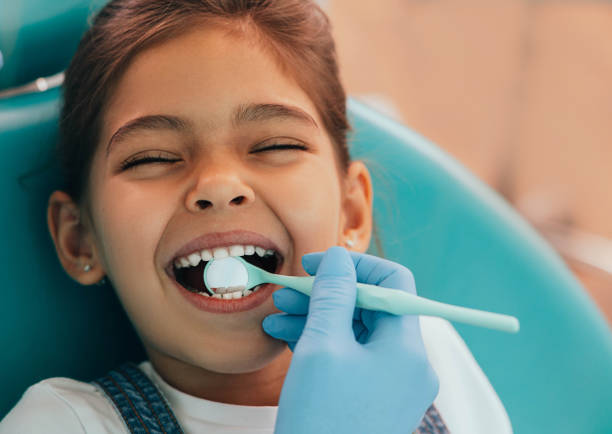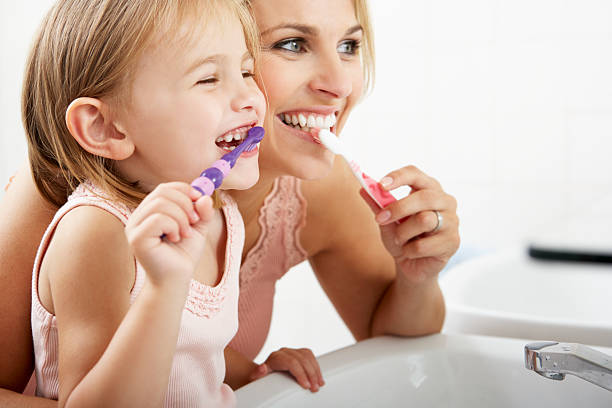Introduction:
Dental care refers to the practice of maintaining oral hygiene and ensuring the overall health of the teeth and gums. It involves a range of activities and habits aimed at preventing dental problems, promoting oral health, and preserving a healthy smile. Dental care encompasses various aspects, including regular brushing and flossing, proper nutrition, routine dental check-ups, and professional treatments or interventions when necessary. Dental care begins at a young age and continues throughout a person's life. It is especially important to establish good oral hygiene habits during childhood, as it sets the foundation for long-term dental health. Parents and caregivers play a crucial role in teaching and guiding children in maintaining proper dental care practices.
Maintaining good oral health is a vital aspect of overall well-being, and dental care plays a crucial role in achieving and preserving a healthy smile. From the moment a baby's first tooth emerges, dental care becomes a significant consideration for parents and caregivers. As a parenting specialist and advocate for comprehensive child development, I understand the importance of dental care for babies. In this guide, we will delve into the world of dental care, exploring the challenges faced by mothers of toddlers and providing valuable insights and strategies to ensure optimal oral health for little ones.

Dental care encompasses a wide range of practices, routines, and preventative measures that are essential for maintaining healthy teeth and gums. It goes beyond simple brushing and flossing to encompass proper nutrition, regular dental check-ups, and early intervention when necessary. By instilling good oral hygiene habits from an early age, parents can set their children on a path to lifelong dental health. In the following sections, we will explore the fundamental aspects of dental care for babies, offering guidance on establishing effective dental hygiene routines and addressing common problems that arise during the toddler years.
We will dive into the importance of teething and provide solutions for alleviating discomfort, examine tooth decay prevention strategies, and discuss the impact of thumb sucking and pacifier use on dental health. Additionally, we will focus on the unique challenges faced by mothers of younger infants who begin teething early, and we will offer advice on fostering healthy eating habits and positive dental experiences. Understanding and implementing proper dental care practices are essential for ensuring that babies and toddlers develop strong, healthy teeth and gums. By familiarizing ourselves with the principles of dental care and addressing potential issues proactively, we can equip parents and caregivers with the knowledge and tools they need to prioritize their child's oral health effectively. So, let's embark on this dental care journey together, embracing the importance of early dental care and nurturing a lifetime of healthy smiles.
The Basics of Dental Care for Babies

1.1: Getting Started with Dental Hygiene
When it comes to dental care for babies, it's important to start early to establish good oral hygiene habits. Even before the first tooth emerges, parents can begin taking steps to ensure a healthy mouth for their little one. Here are some key points to consider:
Introducing the concept of dental hygiene to babies: While infants may not fully comprehend the importance of dental care, it's beneficial to introduce the concept early on. This can be done by gently wiping their gums with a clean, damp cloth after feedings to remove bacteria and promote oral hygiene.
Choosing the right time to start oral care routines: As soon as the first tooth erupts, usually around 6 months of age, it's time to incorporate a toothbrush into the oral care routine. This early start allows babies to become familiar with the process and establishes a foundation for future dental habits.
Understanding the importance of baby teeth: Baby teeth, also known as primary teeth, serve several vital functions. They aid in chewing, speech development, and guide the eruption of permanent teeth. Proper care of baby teeth is crucial to ensure their health and alignment.
Appropriate toothbrush and toothpaste selection: When selecting a toothbrush, opt for one specifically designed for babies or toddlers with soft bristles and a small head to fit comfortably in their mouth. Choose a toothpaste formulated for children, ensuring it is fluoride-free for babies under the age of 2, as excessive fluoride ingestion can be harmful.
Proper brushing techniques for babies: Brushing should be performed gently and with care. Use a small amount of toothpaste (about the size of a grain of rice) on the toothbrush. Hold the brush at a 45-degree angle and brush in gentle circular motions, paying attention to all tooth surfaces and the gumline. Encourage your baby to spit out excess toothpaste but avoid rinsing to allow the fluoride to continue protecting their teeth.
1.2: Establishing a Dental Care Routine
Creating a consistent schedule for dental care: Consistency is key when it comes to dental care for babies. Establish a daily routine that includes brushing teeth twice a day. Choose specific times that work well with your child's schedule, such as after breakfast and before bedtime, and stick to those times consistently.
Making oral hygiene enjoyable for your baby: Dental care should be a positive and enjoyable experience for your baby. Make it a fun and interactive activity by incorporating playful elements, such as singing songs, using colorful toothbrushes, or engaging in imaginative play. This helps create a positive association with dental care, making it easier for your child to cooperate.
Encouraging independence in brushing: As your baby grows, encourage them to participate in their dental care routine. Gradually introduce them to holding their toothbrush and attempting to brush their teeth with guidance. This fosters a sense of independence and responsibility for their oral health.
Exploring fun and engaging oral care products for toddlers: To make dental care more exciting for toddlers, consider using age-appropriate oral care products such as toothbrushes featuring their favorite characters or toothpaste with appealing flavors. This can help capture their interest and motivate them to maintain good oral hygiene practices.
The role of parental supervision in dental care routines: While encouraging independence, parental supervision remains crucial. Ensure that your child is brushing properly and for an adequate amount of time (about 2 minutes). Monitor the amount of toothpaste used and make sure they do not swallow it. Supervision allows for guidance, correction, and ensures the effectiveness of their dental care routine.
By establishing proper dental hygiene practices early on and making it an enjoyable experience, parents can lay a strong foundation for their baby's oral health. Consistency, parental involvement, and age-appropriate oral care products all contribute to fostering positive dental habits and setting the stage for a lifetime of good oral hygiene.
Common Dental Problems Faced by Mothers of Toddlers
2.1: Teething Woes and Solutions
Teething is a significant milestone in a baby's development, but it can be accompanied by discomfort and challenges. Understanding how to navigate this phase and provide relief for your little one is crucial. Here's what you need to know:
Recognizing the signs of teething in babies: Teething can cause a variety of symptoms, including increased drooling, irritability, swollen gums, chewing on objects, disrupted sleep, and loss of appetite. Being able to identify these signs can help you understand when your baby is teething and respond appropriately.
Strategies to alleviate teething discomfort: There are several methods to help soothe your baby's teething discomfort. Gentle massaging of the gums with a clean finger or a chilled teething ring can provide relief. Offering a cold washcloth or teething toys that have been chilled in the refrigerator (not frozen) can also help numb the gums and alleviate discomfort.
Introducing teething toys and remedies: Teething toys made of safe, non-toxic materials provide babies with something safe to chew on, relieving teething discomfort. Look for toys specifically designed for teething, such as those with textured surfaces or filled with water that can be cooled. Avoid teething remedies containing benzocaine, as it can be harmful to infants.
Oral care tips during the teething phase: Teething does not exempt babies from dental care. Continue with regular brushing, even when the gums are tender. Gently brush any erupted teeth with an age-appropriate toothbrush and fluoride-free toothpaste. Maintain good oral hygiene practices to prevent any potential dental issues.
2.2: Tooth Decay Prevention
Tooth decay, also known as dental caries or cavities, is a common dental problem in toddlers. Preventing tooth decay is essential for maintaining good oral health. Consider the following strategies:
Understanding the causes and risks of tooth decay in toddlers: Tooth decay is primarily caused by bacteria in the mouth that feed on sugars and produce acids that erode tooth enamel. Frequent consumption of sugary foods and drinks, poor oral hygiene, and lack of fluoride can increase the risk of tooth decay in toddlers.
Implementing a balanced diet for oral health: A healthy diet plays a significant role in preventing tooth decay. Limit sugary snacks and drinks, including juices and sodas. Encourage a diet rich in fruits, vegetables, whole grains, and lean proteins. Offer water as the main beverage between meals.
Limiting sugary snacks and drinks: Sugar is a major contributor to tooth decay. Minimize the consumption of sugary snacks, candies, and sugary drinks. Instead, opt for healthier alternatives such as fresh fruits, vegetables, and dairy products.
Importance of regular dental check-ups and cleanings: Regular dental check-ups are crucial for monitoring your toddler's oral health and identifying any dental issues early on. Schedule routine visits with a pediatric dentist, ideally every six months, for professional cleanings, examinations, and preventive treatments.
Practicing good oral hygiene habits at home: In addition to dental visits, consistent oral hygiene practices at home are essential for preventing tooth decay. Brush your toddler's teeth twice a day with fluoride toothpaste (in pea-sized amounts for children aged 2 and above) and floss once their teeth start touching. Encourage and supervise brushing to ensure thorough cleaning.
2.3: Thumb Sucking and Pacifier Use
Thumb sucking and pacifier use are common habits among babies and toddlers. While these self-soothing behaviors can provide comfort, prolonged or intense thumb sucking and pacifier use can affect dental health. Here's what you should know:
Effects of thumb sucking and prolonged pacifier use on dental health: Intense and prolonged thumb sucking or pacifier use can cause dental problems, such as misalignment of teeth and an altered bite. These habits can push teeth out of position or affect the growth of the jaw, potentially leading to orthodontic issues.
Strategies to address thumb sucking habits: Most children naturally outgrow thumb sucking. However, if the habit persists, there are strategies to help address it. Encourage positive reinforcement and praise for refraining from thumb sucking. Offer alternatives, such as a comfort object or engaging activities that keep their hands occupied.
Weaning off pacifier dependency: Gradually reducing pacifier use can help wean your child off their dependency. Start by limiting pacifier time to specific situations, such as bedtime or naptime, and gradually phase it out altogether. Offer other comfort measures, such as soothing music or a favorite stuffed animal, to ease the transition.
Encouraging positive self-soothing techniques: Support your toddler in developing alternative self-soothing techniques. Introduce strategies like deep breathing exercises, offering a soft blanket or toy for comfort, or engaging in calming activities such as reading a book or listening to gentle music.
Overcoming Challenges for Babies

3.1: Dental Care for Early Teethers
Some babies may start teething earlier than others, presenting unique challenges for parents. Here's how to address dental care for early teethers:
Special considerations for babies who start teething early: Early teethers require attention to their dental health as soon as their first tooth erupts. Be proactive in establishing a dental care routine and monitoring their oral health from an earlier stage.
Safe teething remedies for younger infants: For babies who begin teething at a younger age, it's important to use safe teething remedies. Opt for teething toys specifically designed for young infants, such as those made from silicone or rubber materials that are soft and gentle on their gums. Always ensure the toys are free from small parts that can be a choking hazard.
Monitoring tooth eruption and development: Keep a close eye on your baby's tooth eruption and development. Note the order in which teeth erupt and ensure there are no significant delays or irregularities. If you notice any concerns, consult with a pediatric dentist for guidance.
Tips for managing discomfort during early teething stages: Early teethers may experience prolonged discomfort during the teething process. Employ soothing techniques such as chilled teething toys, gentle gum massages, and providing cool, but not frozen, teething rings to help alleviate their discomfort.
3.2: Establishing Healthy Eating Habits
Diet plays a crucial role in a toddler's oral health. Here are important factors to consider when establishing healthy eating habits:
The connection between nutrition and oral health: Nutrition plays a significant role in supporting optimal oral health. Ensure your toddler receives a well-balanced diet that includes a variety of fruits, vegetables, whole grains, and lean proteins. These nutrient-rich foods promote healthy teeth and gums.
Introducing solid foods and their impact on teeth: As your baby transitions to solid foods, pay attention to the choices you make. Limit sugary snacks and opt for healthier alternatives. Introduce a wide range of textures and flavors to encourage proper chewing and jaw development.
Implementing a well-balanced diet for optimal dental health: Offer a combination of food groups in each meal to provide essential nutrients for healthy teeth and gums. Incorporate calcium-rich foods like dairy products, leafy greens, and fortified cereals to support strong tooth enamel.
Appropriate portion sizes and mealtime routines: Be mindful of portion sizes and avoid overconsumption of sugary foods and drinks. Establish regular meal and snack times to promote healthy eating habits and minimize exposure to harmful substances that can contribute to tooth decay.
3.3: Encouraging Positive Dental Experiences
A positive dental experience can shape a child's attitude towards oral care. Consider the following strategies:
Building trust and familiarity with dental visits: Start dental visits early to help your child become familiar with the dental office environment and the dentist. Choose a pediatric dentist who specializes in treating children and creates a child-friendly atmosphere.
Choosing a pediatric dentist for your toddler: Pediatric dentists have specialized training in treating children and are well-equipped to address the unique needs of toddlers. Look for a dentist who has experience working with young children and creates a warm and welcoming environment.
Preparing your child for a dental appointment: Prior to a dental visit, explain to your child what to expect in a positive and age-appropriate manner. Use books or videos to help illustrate the dental experience. Assure your child that the dentist and dental team are there to help keep their teeth healthy and strong.
Strategies for managing dental anxiety in toddlers: Dental anxiety can affect children of any age. Employ strategies such as deep breathing exercises, visualization techniques, and positive reinforcement to help alleviate anxiety and create a calm and supportive dental experience.
Reward systems and positive reinforcement for good dental behavior: Encourage and reward your toddler for good dental behavior. Offer praise, small incentives, or a sticker chart to acknowledge their efforts in maintaining good oral hygiene practices. This positive reinforcement can motivate them to continue practicing good dental care.
Conclusion:
Prioritizing dental care for babies and toddlers is paramount for their overall well-being. By following the basics of dental hygiene, establishing consistent routines, and addressing common challenges, parents can ensure optimal oral health for their little ones. In this guide, we have explored the importance of dental care for babies. We began by understanding the fundamentals of dental care, including the appropriate time to start oral care routines, selecting the right toothbrush and toothpaste, and implementing proper brushing techniques. By creating a consistent dental care routine, making it enjoyable, and encouraging independence, parents can instill good oral hygiene habits in their children from an early age.
We then delved into common dental problems faced by mothers of toddlers. Teething woes can cause discomfort, but with strategies to alleviate it and the use of safe teething remedies, parents can help their babies navigate this phase more comfortably. Tooth decay prevention was highlighted as a crucial aspect, emphasizing the role of a balanced diet, limiting sugary snacks and drinks, regular dental check-ups, and practicing good oral hygiene habits at home. Additionally, we discussed how to address thumb sucking and pacifier use, promoting positive self-soothing techniques to minimize their impact on dental health.
Lastly, we addressed the challenges faced by babies of younger age, such as early teething and establishing healthy eating habits. Through monitoring tooth eruption, providing appropriate teething relief, and promoting nutrient-rich diets, parents can support their child's dental health effectively. We also emphasized the importance of positive dental experiences, including building trust with a pediatric dentist, preparing children for dental visits, managing dental anxiety, and utilizing reward systems for good dental behavior.

By understanding and implementing these strategies, parents can lay a strong foundation for their child's dental health. Investing in early dental care and nurturing positive oral hygiene habits contributes to a lifetime of healthy smiles and overall well-being. Remember, regular dental check-ups, consistent oral care routines, and a focus on preventive measures are key to ensuring the ongoing oral health of babies and toddlers.
With the knowledge and tools provided in this guide, parents can confidently navigate the world of dental care for their little ones, fostering healthy teeth and gums for a lifetime of beautiful smiles. Start early, stay consistent, and prioritize your child's dental health – it's a gift that will benefit them for years to come.

